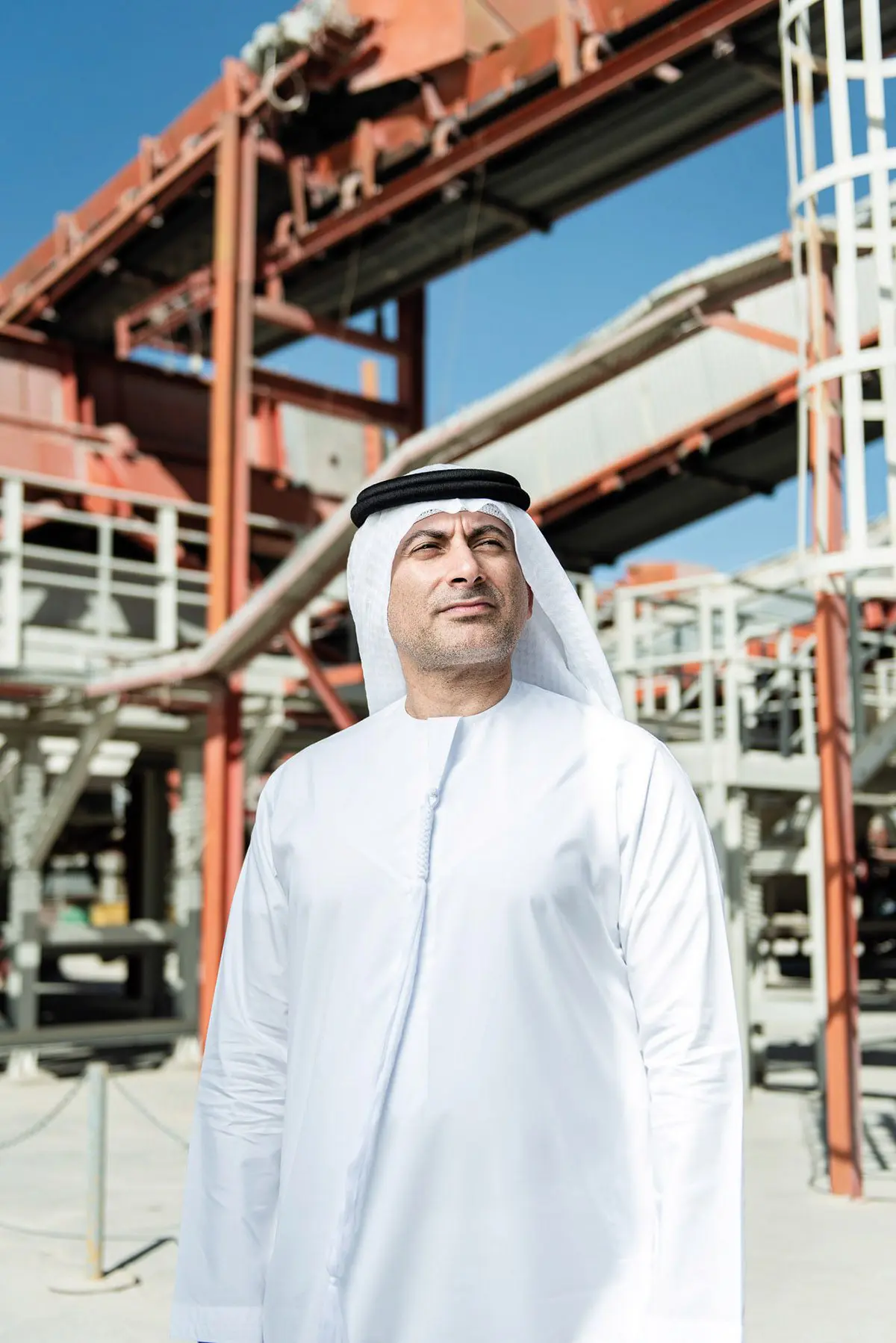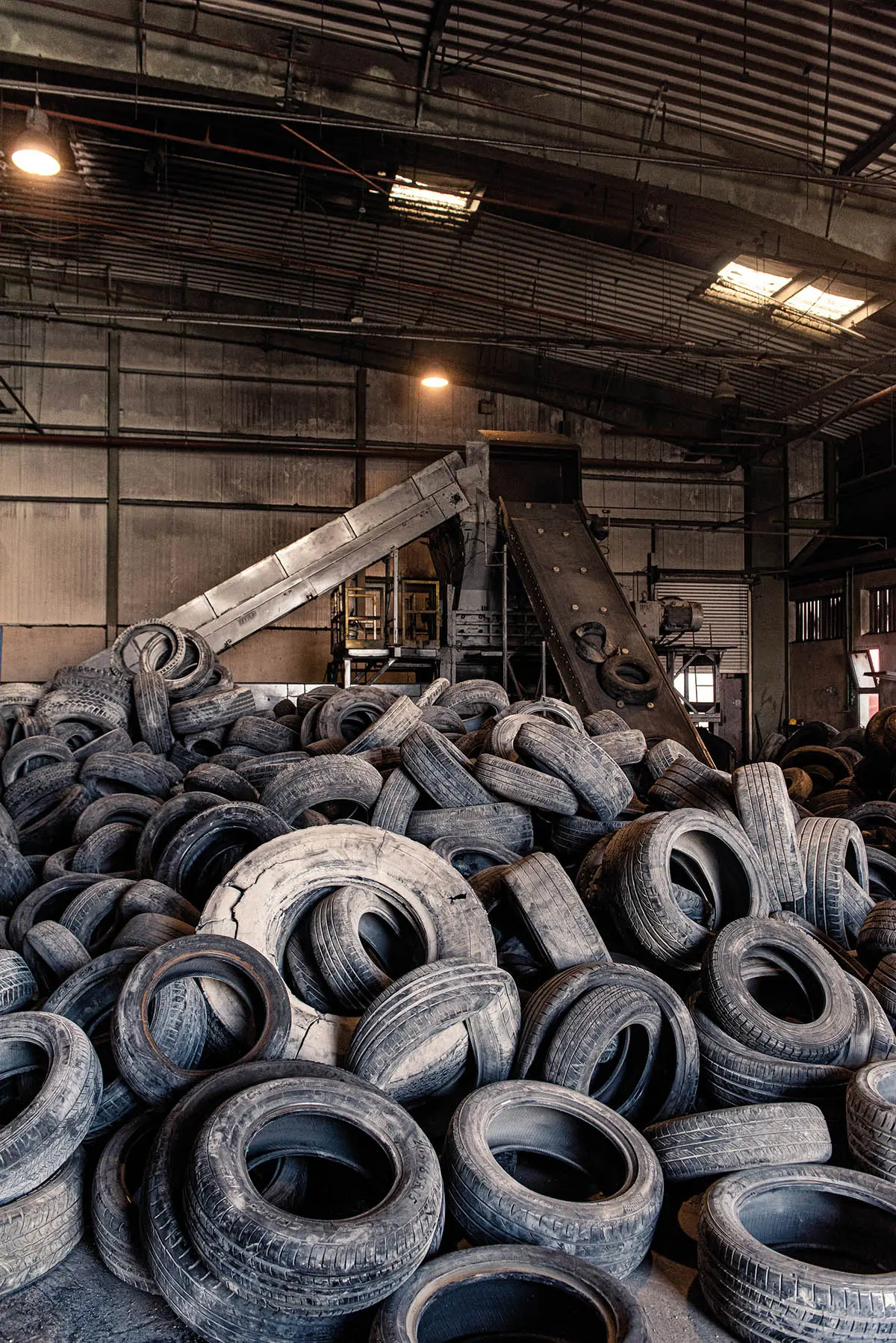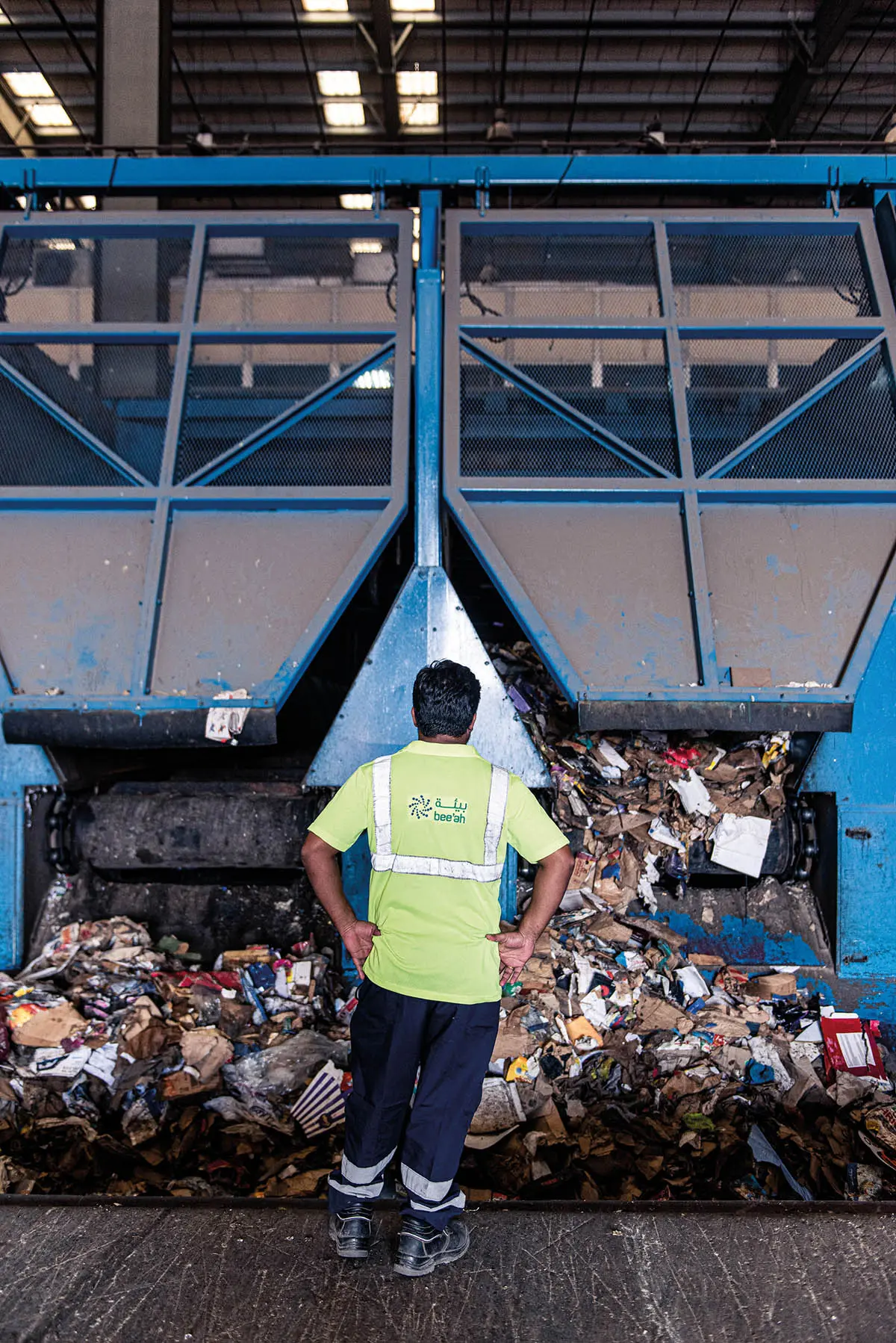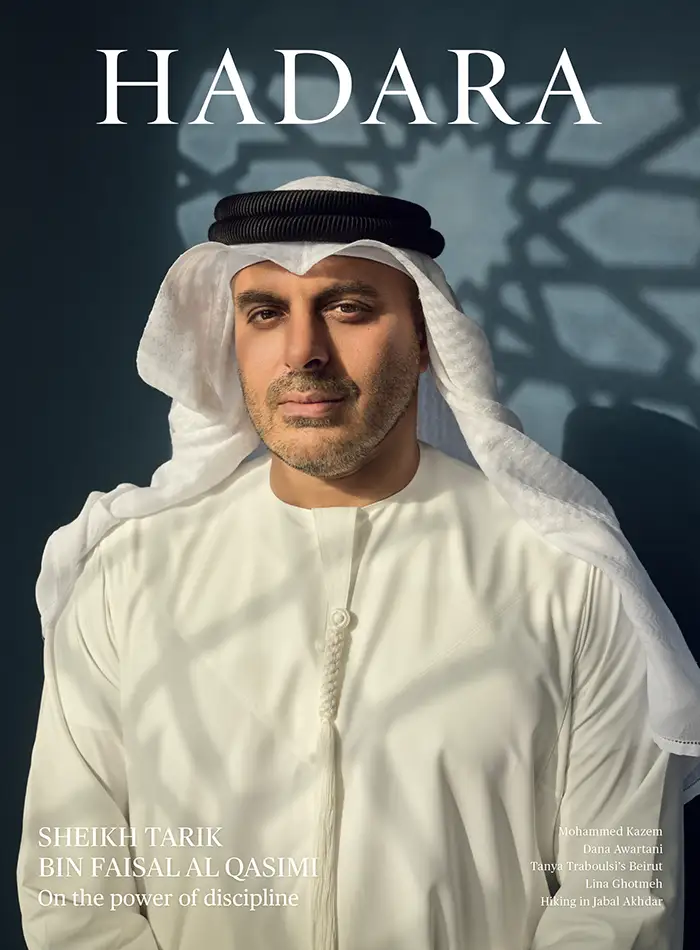Turning trash into treasure
Bee’ah takes its name—which means environment in Arabic—literally and interprets it broadly. Its CEO is finding ways to use technology to improve the quality of life sustainably, reaching far beyond the company’s original mission of collecting rubbish.
BY CATHERINE MAZY

At the outer city limits of Sharjah, on the desert’s edge, a vision of the future rises. A load of recyclables, collected by electric mini-truacks, cascades into a huge shaft, sending plastic bottles, cans and other materials on a high-tech journey to a new life. After passing through an air separator, optical sorters, bag breakers and spectro analysis, the segregated materials are crushed into neat blocks. Old tyres are frozen until they’re so brittle they shatter like glass, to be recycled. Nearby gleams a white building whose forms mimic the desert dunes, the new energy-miserly, artificial-intelligence-driven headquarters of one of the GCC’s most forward-thinking companies, Bee’ah.
Bee’ah, which means environment in Arabic, takes its name literally and interprets it broadly. It is innovating and expanding its expertise into all kinds of environments beyond rubbish removal and recycling. “Our vision is pioneering sustainable quality of life,” says His Excellency Khaled Al Huraimel, Bee’ah’s chief executive. “It’s not just waste management. It’s also transportation, air quality, energy, health care.”
Al Huraimel likes to build, to create something from a nearly blank slate. At Emirates National Oil Company, he took the new international sales unit into 22 countries in just seven years. Then, in 2005, he was approached by developer Nakheel to head the Dubai Waterfront project, that was to be the largest man-made development in the world. Two years later, he formed his own real estate and investment company, Arabian Investments. And in 2009, Bee’ah, then a fledgling waste-management company, recruited him.
“I am used to creating projects from the start,” Al Huraimel says. “Bee’ah wanted to do a lot of environmental change, to improve the quality of life. There was a good cause behind it. I thought the opportunity, having worked in energy and real estate, was good.”
The son of a UAE ambassador, Al Huraimel spent his first 22 years outside the Emirates, in Iran, Belgium, Saudi Arabia and Oman. He earned a degree in marketing from King Fahd University in Saudi Arabia and an MBA from the University of Bradford in the UK. It wasn’t until he had finished his studies that he actually lived in the UAE.

600,000
Tonnes of municipal solid waste that Bee’ah’s Tandeef division treats each year.
3 million
Tyres that Bee’ah recycles each year.
500,000
Tonnes of construction and demolition waste that are recycled by Bee’ah each year.
200,000
Tonnes of municipal solid waste processed daily at Bee’ah’s Material Recovery Facility, the biggest in the Middle East and the third-largest in the world.
76%
Percentage of collected waste that Bee’ah recycles.
His peripatetic youth exposed him to different customs, which may explain why Al Huraimel is able to envision innovative ways of approaching problems and why he is keen to expand Bee’ah’s footprint, both in the variety of services it offers and in markets. “We’re looking for further geographic expansion in waste management, focusing on the GCC and North Africa. In addition, we’re building our vision of diversifying, growing our business with transportation, technology. We’re thinking of getting into health care and building a hospital,” he says. “It’s about quality of life for residents of Sharjah and the UAE. It’s about being an integrated group with a circular economy objective.”
Bee’ah started purely in waste collection and street cleaning, and its first innovation was to treat the task as integrated waste management. It was a big challenge. The UAE generates 1.6 kilograms of waste per person per day, more than double the global average of 740 grams, according to the World Bank. In 2005, only 20% of waste was recycled or reused. His Highness Sheikh Dr. Sultan Bin Mohamed Al Qasimi, UAE Supreme Council Member and Ruler of Sharjah, saw the importance of addressing the problem, decreeing in 2007 the creation of the public-private partnership that created Bee’ah.
Since then, Bee’ah has grown from just 60 to more than 7,000 employees, delivering a growing portfolio of services across the UAE and now also in Saudi Arabia. Most importantly, it has changed the game around waste. It went so far as to send employees house to house to explain how to separate recyclables. “In the region historically, people considered waste a burden,” says Al Huraimel. “People didn’t see the value in it.”
Instead of “out of sight, out of mind,” trash is turning into treasure, thanks to Bee’ah’s innovations. “Waste is a resource,” he says. “We have grown by bringing value back into the waste and bringing it back into the economy.”
One of Bee’ah’s first expansions was to take over management of the Al Saj’ah landfill in 2009. Bee’ah created a huge four-square-kilometre waste-management centre to sort out recyclables. It then completes the circle by turning recyclables into new products, with ever-more streams of materials treated in-house.
“We have the only cryogenic facility to recycle tyres,” he says. “We produce products for jogging tracks, playgrounds and other uses. We are able to recover over 90% of construction waste that we turn into aggregate to use in infrastructure projects, like road base. We also announced we’re building a wood recycling facility to produce products for construction. We are looking at a circular economy where nothing goes to waste.”
As a result, “Sharjah has the highest waste diversion rate in the GCC, at 76%,” Al Huraimel says. “While other cities around the region have tried, we are ahead. It’s partly due to our model, with support from the government. We are a private company, so we have to achieve value for shareholders and we don’t depend on government help. But in our sectors specifically, success is impossible without government support to achieve targets for diversion of waste, to set regulations and to create legislation.”
Al Huraimel is aiming even higher: zero landfill for Sharjah by 2021—a first for the Middle East. The 24% of waste now going to landfill will instead go to a waste-to-energy (WTE) facility under construction in Bee’ah’s waste-management complex in Sharjah that will process 300,000 kilograms of non-recyclable waste into 30 MW of electricity each year—enough to power 28,000 homes. The WTE plant is a joint venture with Abu Dhabi renewable energy company Masdar and fits with Bee’ah’s and the UAE’s focus on renewable energy. The joint venture, Emirates Waste-to-Energy Company, aims to build more WTE plants across the UAE and the Middle East.
In order for WTE to work well, the trash fuel must be homogenous and dry. That means keeping organic waste—food—out of the mix. Bee’ah already has a huge composting operation and is looking to build another. Al Huraimel even expects the ashes from the WTE plant to be recycled into infrastructure materials. And the plant will meet strict European Union Best Available Techniques for capturing emissions.
That’s logical, because air quality is another of Bee’ah’s businesses. So are wastewater management, medical waste disposal, destruction of sensitive documents, soil and groundwater remediation and more. If you don’t want it, Bee’ah is probably taking care of it.

30
Different categories of recyclables that Bee’ah sorts, using high-tech systems.
160,000
Tonnes of non-recyclable waste that will turn into electricity each year in Bee’ah’s new waste-to-energy plant.
170,000
Students who have learned about environmental awareness through Bee’ah’s School of Environment since 2010.
200
Kilograms of waste that each of the new single-seat electric collection trucks from Ducati can carry.
50
Tesla electric semi trucks in Bee’ah’s fleet, the first in the Middle East.
Al Huraimel is moving Bee’ah beyond just the physical aspects of cleanup. Bee’ah is undergoing a digital transformation to deploy technology to make its work more efficient.
“We looked at a lot of innovations,” he says. “We are using technology in everything we do to do the job better.”
More than five years ago, Bee’ah deployed smart bins, a kind of Swiss Army knife for waste collection. They are solar powered. They have compactors, so they can hold more waste. Sensors detect when the bins are full and signal the company that they need to be emptied. Geo-tags on the bins help drivers to find them quickly. Sensors also alert the company if the bins have been tipped over, or if temperatures are rising such that they risk catching fire. Oh, and the bins are also wi-fi hotspots.
Bee’ah’s advanced waste-management software, WastePro+, tracks all the waste in all of Bee’ah’s businesses, from point of collection to recycling, as well as vehicles and drivers. It uses artificial intelligence to optimise collection times, to keep its vehicles off roads during peak traffic and to identify efficiencies. “It’s end-to-end integration,” Al Huraimel says.
Some of the new technology is developed in-house, with its Evoteq division, created three years ago. “One of the pillars of Bee’ah is digitalisation,” Al Huraimel says. “We decided we must invest in technology to sustain our business and vision. We are now doing the largest digital transformation of the municipality, affecting more than 600 services for residents of Sharjah.”
Some of the new platforms use blockchain technology. That includes SmartTrack, a platform Bee’ah co-developed with SAP and IBM to fight counterfeit drugs. It allows customers at pharmacies to scan a product to see whether it is counterfeit. If it is an alert goes to the city health authority. The platform also gives health authorities live information about medical supplies or shortages.
What do counterfeit pharmaceuticals have to do with waste management? “It goes back to sustainable quality of life,” Al Huraimel says. “We want to be an integrated group that’s not just about waste management but that has a circular economy objective.”
Transportation is one of the biggest polluters globally, so Bee’ah is going electric. From its single-seat waste-collection vehicles by Ducati, to its Tesla semi trucks, to the turquoise Tesla Model S electric cars that can be hailed through the Careem platform operated by ION, a joint venture of Bee’ah and Crescent Enterprises. “We’re also building the infrastructure of charging stations in Sharjah,” Al Huraimel says. “We’re creating A-to-Z mobility solutions with sustainable transport.
The crown jewel of Al Huraimel’s focus on sustainability and technology working together to improve quality of life is Bee’ah’s new headquarters. One of the last projects designed by renowned architect Zaha Hadid before her death, the structure undulates like the surrounding sand dunes. “It will be an icon for the region,” he says.
When it opens later this year, the building will be completely powered by renewable energy. The headquarters are set for LEED platinum certification, the highest level of sustainability, reflecting not just the use of renewable energy but also efficient use of energy and water, sustainable materials, emissions and more, from construction to daily use.
To achieve maximum efficiency and sustainability, the building is loaded with technology from Johnson Controls, Microsoft and Bee’ah’s own Evoteq. Photovoltaic cells provide renewable energy, with surplus stored in Tesla Powerpacks.
The 7,000-square-metre building will also use artificial intelligence. When a visitor comes to the building, it will recognise them, know who they are there to meet and inform that person, then guide the visitor to the correct meeting room. The building can listen to the meeting, record notes and mail participants the minutes of the meeting. Employees can schedule vacation time by just talking to the building. AI also will monitor staff performance.
“It embraces our vision for the future,” Al Huraimel says of the HQ, “focusing on and embracing technology to improve.”


